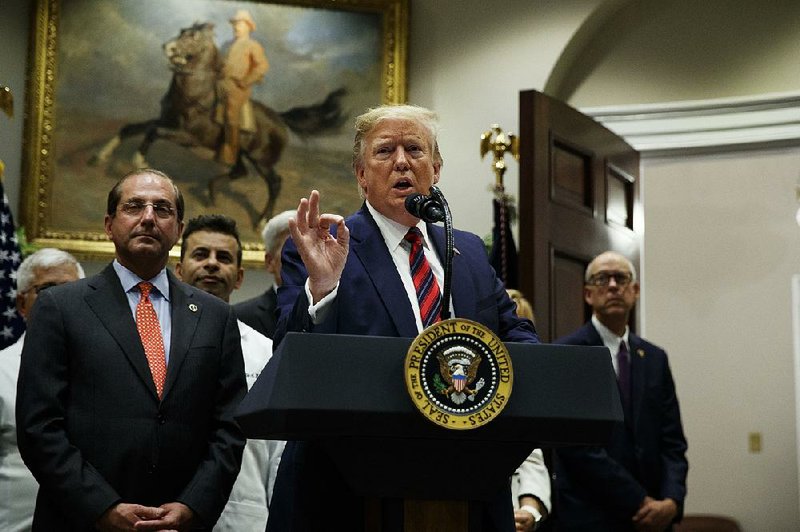WASHINGTON -- President Donald Trump on Thursday called for an end to "surprise medical bills," the charges insured patients can face when a member of a medical team that treats them is not in their insurer's network.
"Not a pleasant surprise," Trump said of bills that arrive in the mail and run to tens of thousands of dollars. "A very unpleasant surprise."
The administration threw its support behind efforts by lawmakers of both parties to address the problem, laying out a set of goals for legislation.
With polls showing that voters trust Democrats over Republicans on health care, Trump has been hitting pocketbook medical issues that resonate with the middle class, like prescription drug costs. He was joined at a White House event by patients, one who got a $110,000 bill after a heart attack, and another who got a bill for $17,850 for a test for which her insurer would have paid $100.
"So this must end," Trump said. "We're going to hold insurance companies and hospitals totally accountable." The president said he wants to get it done "quickly," and Sen. Lamar Alexander, R-Tenn., chairman of the Health, Education, Labor and Pensions Committee, said he hoped to deliver a legislative bill in July.
Just before Trump spoke, the Democratic and Republican leaders of a key House committee said they are ready to move on legislation.
"No family should be left in financial ruin through no fault of their own, which is why we have been working together on a bipartisan solution to protect patients that we hope to announce soon," Energy and Commerce Chairman Frank Pallone, D-N.J., and ranking Republican Greg Walden, R-Ore., said in a joint statement. The panel oversees the health insurance industry.
Pallone and Walden are not alone; more than a half-dozen senators and representatives have floated ideas or drafted legislation. Rep. Lloyd Doggett, D-Texas, chairman of the Ways and Means health panel, has a bill. Sens. Bill Cassidy, R-La., and Michael Bennet, D-Colo., collaborated on a bipartisan proposal, and other plans come from New Hampshire Democratic Sens. Maggie Hassan and Jeanne Shaheen.
"Surprise" bills amounting to tens of thousands of dollars can hit patients and their families when they are most vulnerable -- after a medical emergency or a complex surgical procedure. Often patients are able to negotiate lower charges by working with their insurers and the medical provider. But the process usually takes months, adding stress and anxiety. Sometimes it doesn't work out and the bills are sent to collection agencies.
White House officials outlined a set of principles for legislation that Trump can back:
• Patients who receive emergency care should not be hit with charges that exceed the amount paid to in-network providers. In an emergency, patients are in no position to check whether their insurers have contracted with the surgeons or anesthesiologists who provide care.
• Patients going in for a scheduled procedure should get upfront information about whether their clinicians are in their insurer's network and what costs they will face. Patients should not get out-of-network bills from a provider they did not pick.
• Fixes should not add to federal health care costs.
States also have been working to protect consumers from surprise medical bills. A survey of states by Georgetown University found that about half have acted to protect consumers. California, Connecticut, Florida and a handful of others, have the most comprehensive protections.
But states don't have jurisdiction over most health plans sponsored by large employers, which cover about 100 million people and operate under the umbrella of a federal law.
A coalition that includes major insurers, business groups and consumer organizations has been pressing Congress for federal legislation. The basic elements would include informing patients when a doctor or service provider is out-of-network, setting a federal standard for what out-of-network clinicians can charge, and guaranteeing that the changes do not lead to premium increases.
A major hang-up has been agreeing on payment rates for out-of-network services that are mutually acceptable to medical specialists, hospitals and insurers, who have conflicting interests.
Another sticking point is the role of arbitration in settling billing issues. Some doctors groups favor arbitration, but White House officials who spoke with reporters Thursday said they're not keen on it.
Trump also indicated that his administration may approve a Florida plan to import lower-cost prescription drugs from abroad for use by residents.
Drugs in other economically advanced countries are often much cheaper because governments set prices.
"We may allow states to buy drugs in other countries if we can buy them for a lesser price, substantially less price, and that is going to be very unique," Trump said.
He added that with "certain permissions" states will be able to import prescription drugs from abroad "if they can buy them for 40%, 50%, 60% less."
Trump's comments were an apparent reference to an importation plan recently passed by the Florida Legislature and expected to be signed by Republican Gov. Ron DeSantis, a Trump ally who made it one of his priorities.
Business on 05/10/2019
